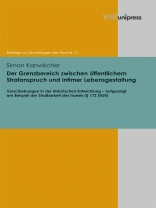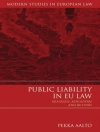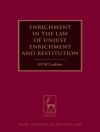This thesis examines the development of the prohibition of incest since the formation of a normative system. It elaborates on the philosophical basis of the legitimacy of penal provisions from the age of Enlightenment and illustrates their practical implementation. A significant part focuses on the development and the perception of the Prussian Criminal Code. Another emphasis is on the social utopias of the late 19th century. The paper points out the reform approaches of laws governing sexual and moral offenses until 1933, ensuing from the discussion about the matter of legally protected interests. Especially, it takes into account the influences of anthropological criminology and the impacts of the political struggle. Following a discussion on the course of the latest reform efforts, it uses the results of the analysis to examine the jurisdiction of the Federal Constitutional Court critically. The dissertation concludes with the author’s proposal for a reformulation of § 173 St GB.
Over de auteur
Prof. Dr. Stephan Meder lehrt seit 1998 Zivilrecht und Rechtsgeschichte an der Juristischen Fakultät der Universität Hannover.












